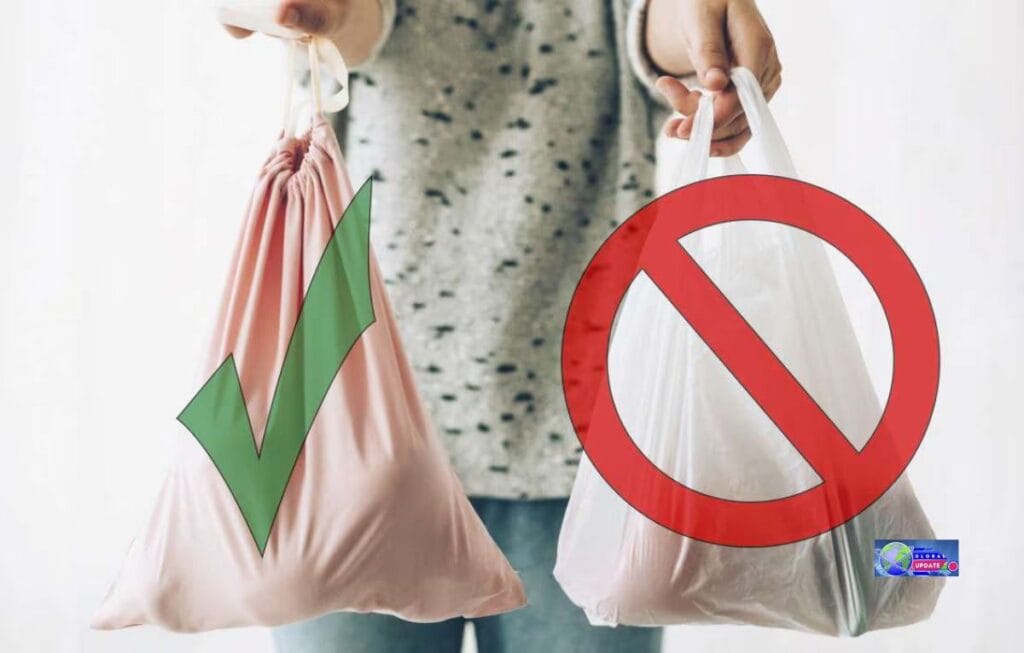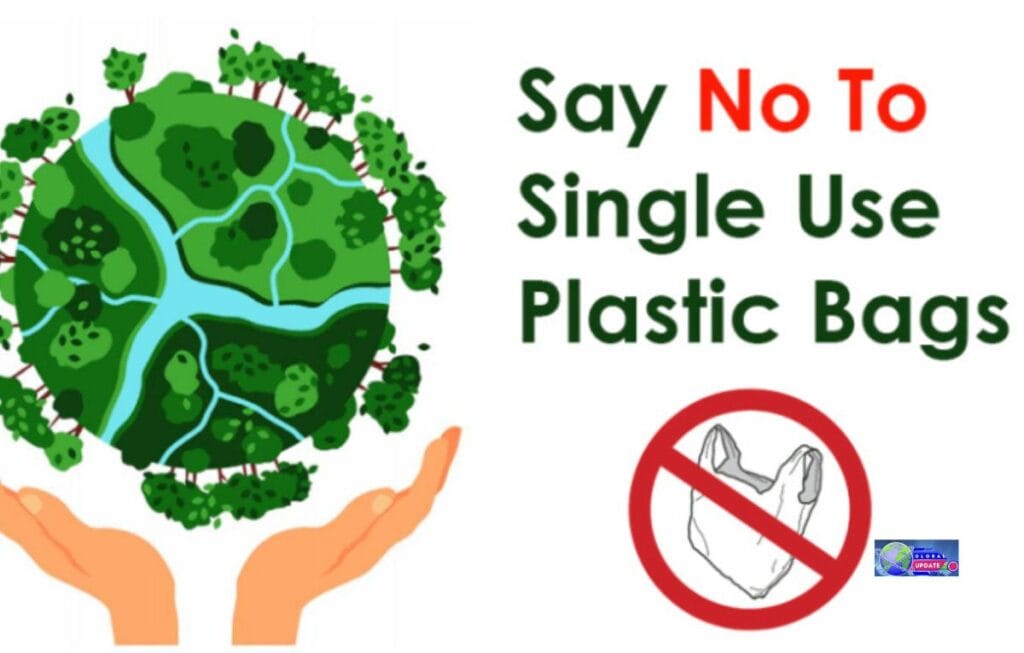The Sindh government has said that starting June 15, it will not allow the production, sale, or use of plastic bags in the province. This rule will be followed in all of Sindh’s areas, even Karachi.
The Government of Sindh has announced that plastic bags will be banned throughout the province after June 15, 2025, in a historic move reflecting growing environmental concern.
A New Era for Being Responsible for the Environment.
The big goal of this project is to fight pollution, safeguard marine ecosystems, and encourage people to use eco-friendly options in their daily lives. Pakistan is still dealing with the long-lasting effects of plastic waste, and Sindh’s move is being hailed as a significant turning point in the country’s environmental policy.
What caused Sindh to need this ban?

In Sindh, particularly in cities like Karachi and Hyderabad, the usage of plastic bags has skyrocketed over the past two decades. Because people only use these bags once and then throw them away, they have clogged drains, suffocated rivers, and left trash on streets and beaches.
The Sindh Environmental Protection Agency (SEPA) says that every day, people in the province throw away hundreds of tonnes of plastic that can’t be recycled or are thrown out incorrectly. When it rains, city streets often turn into rivers of floating trash, worsening health and cleanliness problems. For a long time, experts have warned that Sindh’s plastic waste could worsen and not improve unless drastic steps are taken.
This is the official announcement.
In late April 2025, there was an official news conference in Ki. Agha Shah Nawaz, responsible for climate change and the environment, announced that starting on June 15, making, distributing, selling, or using plastic bags, no matter their size or thickness, will be illegal in the whole province.
He said, “This choice is not just about getting rid of plastic bags.” “It’s about changing the way you think.” It’s about making Sindh cleaner and healthier for the next generation.
What the ban covers: What Comes With It?
The ban on plastic bags includes the following:
Plastic bag factories will have to shut down, but there is a grace period until June 15, 2025.
Plastic bags can’t be brought into the country or moved between districts.
Strict punishments for breaking the law include fines for store owners, distributors, and plant owners who are caught.
Eco-friendly alternatives, such as cloth, paper, and jute bags, should be promoted and subsidised.
Strategy for Implementation to Ban Plastic Bags.
The Sindh government has developed a comprehensive plan to ensure proper implementation of the ban:
Step 1: Campaigns to raise awareness.
A program to raise awareness has been ongoing throughout the province since May 1, 2025. Calls for public service are broadcast on the radio and TV. At the same time, ads on social media, posters, and seminars teach people about the harms of plastic pollution and the advantages of using alternatives that can be reused.
Step 2: Train vendors and find other ways to distribute the goods.
Store owners are taught to switch to paper or cloth bags, especially in small towns and rural areas. Nongovernmental organisations (NGOs) and local factories are rewarded for making solutions cheaper.
Step 3: Toughening up on people who don’t obey the rules.
Starting June 15, 2025, inspection teams led by SEPA and local district governments will oversee markets, bazaars, and manufacturers. Depending on the severity of the violation, people who break the rules will be fined between Rs 5,000 and Rs 50,000.
Response from the public and support from civil society.
Most people who have heard about the ban have been encouraging. Environmental groups, students, and health supporters are pleased with the decision and praise the government’s dedication to the long-term health of the environment.
As Sana Fatima, an environmental science student at the University of Karachi, said, “We’ve seen how plastic bags kill the plants and animals around us.” We can make things better if we work together to pass this ban.
Reusable bags are now available at many big stores and shopping malls, and many customers bring their bags with them when they shop.
However, small sellers and street vendors are worried about the cost of other options. They aim to minimise expenses. The government has promised subsidies and tax breaks to local companies that make eco-friendly bags.

Effects on the Environment: Why They Matter.
Plastic bags are known for taking a long time to break down. Over 500 years may pass before a single plastic bag decomposes. At the same time, it breaks down into tiny pieces called microplastics that get into the land, air, and food chains and hurt people and the environment.
Plastic trash has damaged Sindh’s coastal area, which has mangroves, fish nurseries, and a fragile marine environment. Wild animals often eat plastic by accident, which can kill them.
After banning plastic bags, Sindh should be able to cut its plastic trash by almost 30% in the first year alone. This will lead to: better drainage systems and fewer floods in the city.s
Better health results by cutting down on places where mosquitoes and other pests can breed
Less damage to animals in the water and on land
A more eco-friendly way for tourists to enjoy the province’s beaches and national parks
Regional and international settings.
Sindh is the latest area in Pakistan to ban similar activities. Other regions, like Islamabad Capital Territory and Khyber Pakhtunkhwa, have tried such measures with different degrees of success. Around the world, more than 90 countries have passed laws that limit plastic bags. Rwanda, Kenya, and Bangladesh are often considered leaders in managing plastic.
This move brings Sindh closer to the world’s sustainable development goals (SDGs), especially SDG 13: Climate Action and SDG 12: Responsible Production and Consumption.
Problems to Come.
The move is a big step forward, but Sindh still has a long way to go before it is plastic-free. Important problems are:
Ensuring uniform enforcement across all areas is crucial.
The goal is to stop the criminal production and smuggling of plastic bags.
Helping small companies and communities that have been left out during the transition.
Long-term ways to keep the people interested and working together.
This project’s success will mostly depend on how long the political will lasts, how well the administration works together, and how involved the community is.
What People Can Do to Move Forward.
The government has asked everyone in the country to get involved in this project. People can help by not using plastic bags and bringing reusable ones instead.
Telling friends and family about the ban.
Helping local companies make eco-friendly bags.
School programs and youth groups are being used to raise awareness, and several colleges have promised to have plastic-free campuses by the end of 2025.
In conclusion, Sindh can become cleaner.
Pakistan’s environmental strategy has changed since the Sindh government decided to ban plastic bags. This ban clarifies that sustainability is no longer a choice but a must. Should this ban succeed and garner significant backing, it could serve as a nationwide model for other provinces and regions. Different provinces and areas across the country could use it as a model.
By taking this brave step, Sindh hopes to reduce smog, change people’s habits, encourage them to care for the environment, and build a greener, healthier Pakistan.
Keep on Reading:
- Mastering Remote Work Skills for 2025 Success
- Deadline Announced for Starting of Ban on Plastic Bags in Sindh



